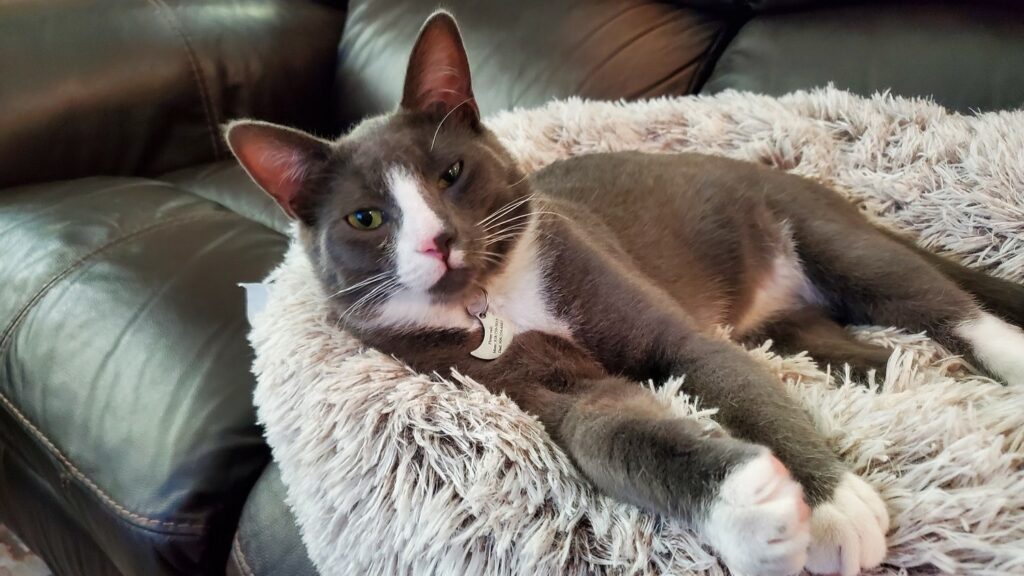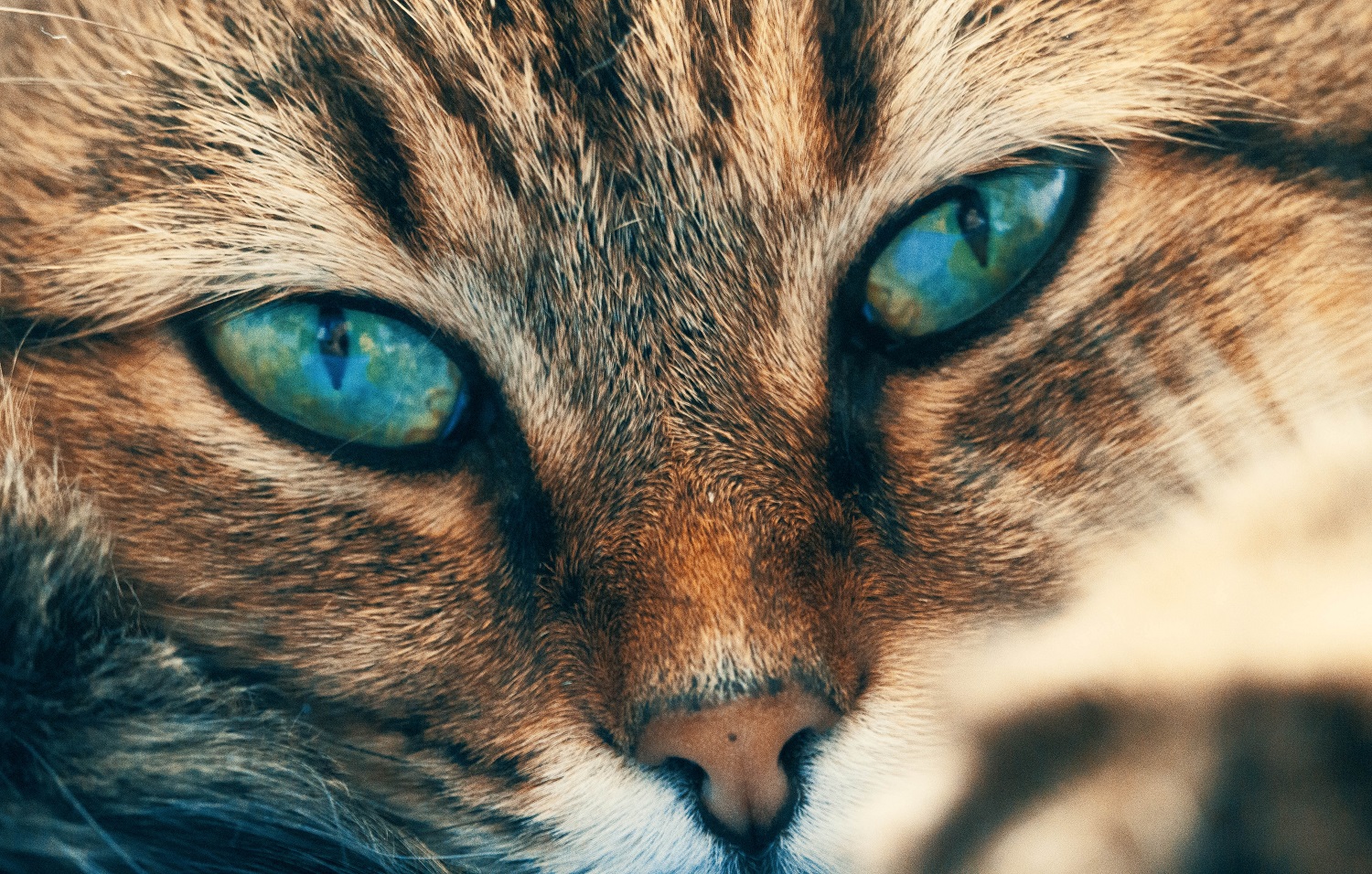Noticing something unusual with your cat’s eye can be alarming, especially if it involves twitching, squinting, or a noticeable buildup of gunk. While an occasional blink or a little eye crust is usually harmless, frequent twitching or eye discharge could mean something more serious is going on.
Let’s break down the most common reasons your cat’s eye might be twitching and producing discharge, when it’s nothing to worry about, and when it’s time to call the vet.
What Counts as Normal?
Before diving into the possible causes, it helps to understand what is normal for a healthy cat’s eyes.
Most cats have clear, bright eyes with very little discharge. A small amount of crust in the corner of the eye after sleeping is normal and not a cause for concern. Occasional blinking or light twitching while resting can also happen and is often harmless.
But if the twitching becomes frequent, the eye stays partially closed, or the discharge is colored, sticky, or excessive, it could be a sign of irritation or illness.
Common Causes of Eye Twitching and Discharge in Cats
1. Conjunctivitis (Pink Eye)
Conjunctivitis is one of the most common eye problems in cats. It occurs when the conjunctiva (the thin tissue lining the eyelids) becomes inflamed.
Symptoms often include:
- Redness in or around the eye
- Swelling of the eyelids
- Watery, yellow, or green discharge
- Frequent blinking or twitching
- Pawing at the eye
Conjunctivitis can be caused by infections, allergies, or even irritants like dust or smoke. It’s usually treatable but may require prescription eye drops or ointment from your vet.
2. Upper Respiratory Infections
If your cat’s eye symptoms are paired with sneezing, nasal discharge, or lethargy, an upper respiratory infection (URI) could be the cause. These infections are especially common in kittens and shelter cats and are usually caused by viruses like feline herpesvirus or calicivirus.
Even after the main symptoms clear up, lingering eye irritation can remain for a while. In some cases, cats with chronic feline herpes may experience recurring eye issues throughout their lives.
3. Allergies or Environmental Irritants
Just like people, cats can be sensitive to things in their environment. Dust, pollen, cigarette smoke, scented cleaners, or even new litter can cause eye irritation and twitching.
If your cat’s symptoms seem mild and only appear after exposure to certain triggers, try to identify and remove the source.
4. Foreign Objects
Something as small as a bit of fur, dust, or a stray eyelash can irritate your cat’s eye and lead to twitching or watering. In most cases, the eye will flush the irritant out naturally, but if the problem continues or your cat seems uncomfortable, it is best to get a vet to take a look.

When I was little and decided to make this my home, the Mom person would wrap me up and the Dad would put stuff in my eye. I don’t know why. It must have been some kind of weird human ritual. All I know is it was like acid or something and I didn’t like it. I think they were trying to blind me so I would be completely dependent on them. Every time they played their sick game, I fought them until they released me. They finally learned their lesson and stopped. I am the King. #AlwaysVictorious #Don’tMessWithKitties #You’reNotToughEnough
Winston
Signs something might be stuck in the eye include:
- Squinting one eye
- Constant blinking or twitching
- Rubbing the eye with a paw
- Sudden onset of symptoms without other signs of illness
5. Corneal Ulcers or Scratches
Injuries to the surface of the eye can cause pain, twitching, and visible discharge. These are often the result of rough play, scratches from other pets, or accidental contact with a sharp object.
Corneal issues are serious and require prompt veterinary treatment to prevent infection or long-term damage to the eye. You may not see the injury with the naked eye, but signs of discomfort and excessive tearing should not be ignored.
What Is the Discharge Telling You?
The color and texture of your cat’s eye discharge can give you clues about what is going on:
- Clear and watery: Usually mild irritation or allergies
- Yellow or green: Likely a bacterial or viral infection
- Thick or crusty: Possibly chronic inflammation or an ongoing health issue
- Bloody or dark-colored: May indicate trauma or something more serious
If the discharge is persistent, worsening, or combined with swelling or behavior changes, schedule a vet visit right away.
When to See the Vet
Eye problems can get worse quickly if not treated, so it is important to know when to seek help. Call your vet if you notice:
- Squinting or twitching that lasts more than a day
- Colored or thick discharge
- Swelling or redness around the eye
- Sensitivity to light
- Loss of appetite or energy
- Any signs of pain or distress
Do not try to treat eye issues with over-the-counter products or medications made for humans. Cats have sensitive eyes and need treatments that are safe for their species.
How to Help at Home
While waiting for your vet appointment, you can gently clean around your cat’s eyes using:
- A soft, damp cloth or cotton ball
- Warm water (no soap or cleaning products)
- A gentle wipe outward from the inner corner of the eye
Keep your cat indoors and away from drafts, irritants, or other pets until you know the cause. Avoid touching or rubbing the eye directly.
Final Thoughts: Don’t Ignore Eye Changes
If your cat’s eye is twitching, producing discharge, or just not looking right, it is always better to check in with your vet. Eye problems can range from mild to serious, and early treatment can prevent long-term damage.
In the meantime, monitor your cat’s behavior, keep their space clean and stress-free, and trust your instincts. If something seems off, your cat is counting on you to notice.
Sources:
– Eye Discharge in Cats https://www.petmd.com/cat/general-health/eye-discharge-cats
– Conjunctivitis in Cats https://vcahospitals.com/know-your-pet/conjunctivitis-in-cats
– Cat Eye Conditions and Treatments https://www.icatcare.org/advice/cat-health/eye-problems
– Feline Upper Respiratory Infections https://www.aspca.org/pet-care/cat-care/cat-upper-respiratory-infections
– Common Eye Problems in Cats https://www.humanesociety.org/resources/common-cat-health-issues
Recent Posts
Your Cat Might Be a Furry Little Healer… or at Least a Fuzzy Alarm System If you’ve ever had your cat suddenly become extra clingy when you’re under the weather, you’re not alone. From...
Cats are experts at hiding things, socks under furniture, their disdain for your playlist, and, unfortunately, symptoms of illness. In the wild, showing weakness could make them a target, so even...


